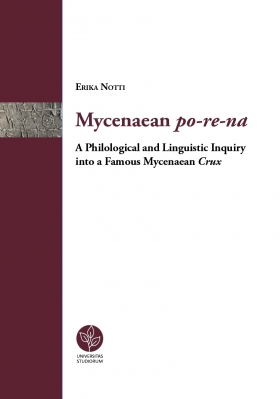Collana "Strumenti", n. 24
A Mycenaean tablet from Pylos (PY Tn 316) has become one of the most controversial and deeply-investigated documents of the whole Mycenaean corpus, due to its various peculiarities and a possible interpretation of the text itself, involving the question of human sacrifice in the Aegean world. In particular, the text contains a famous linguistic crux, which is the syllabic sequence po-re-na. In the light of the fresh archaeological evidence discovered on the island of Crete – e.g. the recent discoveries at Khania – and the new philological data emerging from the study of the Mycenaean evidence attesting the existence of the cult of Dionysos, this study intends to investigate this famous Mycenaean crux.
Erika Notti is a Research Fellow at the IULM University of Milan, where she has specialized in the study of the languages and scripts of the Mediterranean. Her researches have dealt with the Aegean languages and scripts of the II millennium BC. Her studies have focused in particular on the linguistic and philological aspect, and on epigraphy and palaeography. Among various essays and monographs, her previous publications include Note paleografiche sul segnario della lineare A. Riflessioni preliminari sul corpus di Thera (2012), Atlantide (2009) and Lo spazio circolare nelle culture dell’Indeuropa (2007).
Volume disponibile:
- presso il tuo libraio di fiducia
- online su Libreriauniversitaria e a breve su Youcanprint, IBS, Amazon
